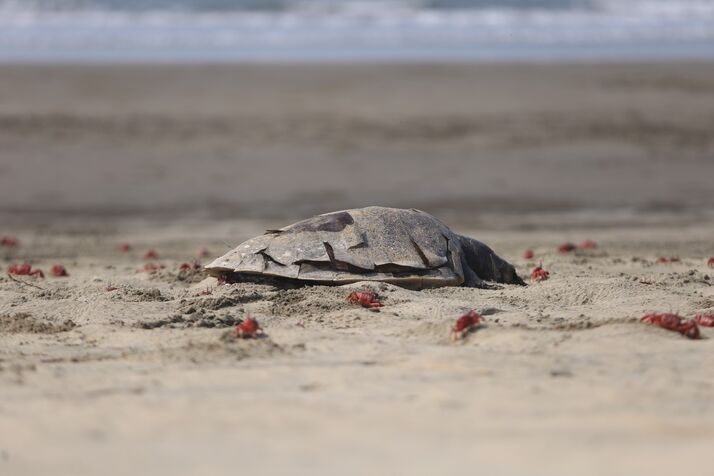A lifeless turtle washed ashore on Cox’s Bazar beach, captured through the lens of Cox’s Bazar Life, tells a silent but harrowing tale of human indifference. Sadly, such scenes are no longer rare. Year after year, dead sea turtles drift ashore, victims of human negligence. These marine creatures, crucial to the biodiversity of our coasts, are bearing the ultimate cost of our actions.
Bangladesh’s coast is home to five of the seven species of sea turtles found worldwide. Olive ridley, green turtles, and hawksbill turtles frequently nest in regions like Cox’s Bazar, Teknaf, St. Martin’s Island, Sonadia, and Kuakata. Yet their survival is jeopardized, with human activity being the primary cause.
Causes of Turtle Death
Experts point to fishing practices as a major threat. Large trawlers and their expansive nets trap and kill turtles, and gill nets near the shore often injure them. From November to March, turtles face further threats during nesting seasons when they come ashore to lay eggs.
Marine pollution exacerbates their plight. Plastic waste, oil spills, discarded nets, and Styrofoam contaminate the sea, obstructing their breathing or becoming fatal when ingested. Propeller strikes from boats and trawlers also cause severe injuries. While natural predators like sharks occasionally prey on turtles, the impact of human-induced threats far outweighs these natural risks.
A Call to Action
The ocean provides food, oxygen, and the wonder of aquatic life. Yet, innocent creatures like turtles are falling victim to human greed, ignorance, and pollution.
Authority must act to halt this silent cry from the sea. Sustainable fishing practices, pollution control, and establishing safe nesting grounds for turtles are crucial. Without these measures, we risk losing these precious species forever.
By Rajin Saleh
Photo: Hussain Shetu










